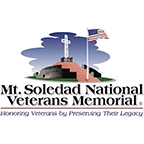Mt. Soledad National Veterans Memorial: Explore Military History

Mt. Soledad Veterans Memorial – History
The walls of Mt. Soledad National Veterans Memorial are as unique as the veterans who adorn them. Unlike other veteran’s memorials, we choose to honor veterans both living and deceased. We believe a service member should know how grateful their nation is of their service. Our walls list more than names; black granite plaques that feature the stories, pictures, and accomplishments of the brave men and women who have served our country and our allied forces make them up. Mt. Soledad didn’t always have its plaques or a cross. Our humble beginnings stared with iconic views of our beautiful city and coastline.
The Construction Of Mt. Soledad
In 1908, President Theodore Roosevelt’s Great White Fleet was anchored off San Diego and Mt. Soledad was the only vantage point to view the entire fleet. Then in 1927, Charles Lindbergh and his new bride Anne took to gliding lessons atop Mt. Soledad and Anne became the first woman (and tenth person in the U.S.) to earn a First-Class Pilot’s License. At the height of WWII, Mt. Soledad was used as an observation point and radio transmission tower to monitor the real threat of Japanese sea forces and broadcast Easter Services to troops from Mt. Soledad connecting those serving at home and abroad a connection to home.
Over the course of fifty years, three crosses have been built on the site of Mt Soledad. The first cross was a simple red wood structure erect in 1913, only to be torn down by vandals ten years later. Residents of San Diego built the second cross in 1923 from stucco over a wood frame and stood for 29 years. This cross, along with the first, were use as gathering places for Easter Sunday. A windstorm destroyed the cross in 1952.
In 1954, the third cross, which still stands today, was damaged when dropped by a crane before it was installed. The cross that we see today acts as a centerpiece to the memorial. It was erected as a lasting monument for servicemembers who sacrificed their lives for our nation during the first and second world wars and the Korean Conflict.
Simultaneously, the Mt. Soledad Memorial Association created and signed its articles of incorporation as the third cross was installed. This Association would grow into what is now Mt. Soledad National Veterans Memorial. The goal of the organization has always been to honor servicemembers who honorably fought for our nation’s freedoms living and deceased. Easter Sunday 1954 entered history when we held a dedication to honor the brave men and women who fought to protect our freedom. This became an annual tradition in the early years of the organization.
While the cross was originally named the “Mount Soledad Easter Cross”, the name was shortened in the 1980s, in part due to religious concerns. Such concerns were the cause of a landmark court case that embroiled the monument for decades. From 1989 to 2015, Mt. Soledad’s cross faced several legal challenges.
On May 31, 1989, a Vietnam War veteran sued the City of San Diego, claiming that the cross violated both the California and United States Constitutions. This initial case led to the court ruling against the city, naming the cross unconstitutional. A long series of similar court cases followed to determine the fate of this landmark. The City of San Diego also attempted to sell the cross on multiple occasions, but court rulings and voters continually blocked these efforts.
In the 90’s, Mt. Soledad Memorial Association became incentivized to begin construction on a new project that would accomplish the goal their association set out to do in the beginning: honor all veterans, regardless of status, rank, race, religion, or creed who protected our country. This project aimed to be a better, more focused, and permanent dedication than those held on Easter Sundays.
James Alcorn came in and entered the preliminary designs for this new wave of the memorial. His initial designs included personalized black granite plaques, which he engraved with photos and information about the honored veterans, and mounted on walls encircling the center hill. He intended this design to encourage people to walk around the memorial and appreciate the diverse contributions that individuals in the Armed Forces made to keep our country safe.
Alcorn’s final design included six low walls radiating outward from a pedestal marked with an American flag. The walkways in between these polished stone walls would be brick, and each wall would be filled with 3,200 engraved plaques made of black granite. This would bring visitors close to the acknowledgements and recollections of each individual veteran. Breaks between walls would allow for contemplation. Each space between the walls featured beautiful views of the ocean and the eastern mountains to calm the mind and lend to somber contemplation.
Each individual plaque would feature one or more photos of the veteran listed. They would also include a short summary that outlined the veteran’s service record and insignias. These insignias could represent the branch of the military in which the veteran served, the American flag, or any other piece of memorabilia that represented that person.
In the following years, the Mt. Soledad Memorial Association attempted to donate the site to the Department of the Interior and National Park Service, and sought to have the government acquire the memorial via eminent domain. However, court rulings challenged and blocked these efforts as well.
Ultimately, the legal matters settled in September of 2016.. The Mt. Soledad Memorial Association was able to purchase the land under the cross for $1.4 million from the Dept. of Defense in July of 2015.
Mt. Soledad National Veterans Memorial Today
Since then, the memorial has added an additional five walls, completed later in 2015. This allowed for the addition of more than 2,400 plaques for those individuals wished to honor their loved ones who had served their country. The expanded memorial also allowed an opportunity to clearly identify the name of the memorial and its purpose through the construction of a wall with the memorial’s name on it. As part of this expansion, the memorial added a central grass area for use throughout the year for Veterans Honor Ceremonies, weddings, reenlistments, military retirements, commissionings, pinnings, and other special events.
Today, Mt. Soledad National Veterans Memorial’s goal remains telling the stories of our service members and reminding people of the ultimate sacrifice our soldiers make to keep our country free and safe. Telling the stories of these brave service men and women is incredibly important to us. Their stories deserve recognition, and we do our part by putting their stories on their plaques.
Among those honored at the memorial include:
- 23 Medal of Honor Recipients
- 6 U.S. Presidents, including Truman, Eisenhower, Ford, and Reagan
- Admirals Stockdale and Halsey
- Generals Pershing and Patton
- Celebrity-Veterans Audie Murphy and Jimmy Stewart
- Thousands of other brave and courageous men and women




